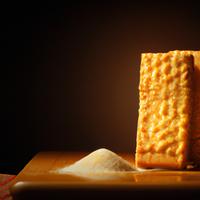
1 serving (30 grams) contains 120 calories, 2.0 grams of protein, 4.0 grams of fat, and 18.0 grams of carbohydrates.

Log this food in SnapCalorie

Nutrition Information
Calories |
960 | ||
|---|---|---|---|
% Daily Value* |
|||
| Total Fat | 32.0 g | 41% | |
| Saturated Fat | 8.0 g | 40% | |
| Polyunsaturated Fat | 0 g | ||
| Cholesterol | 0 mg | 0% | |
| Sodium | 1200 mg | 52% | |
| Total Carbohydrates | 144 g | 52% | |
| Dietary Fiber | 8.0 g | 28% | |
| Sugars | 40.0 g | ||
| protein | 16.0 g | 32% | |
| Vitamin D | 0 mcg | 0% | |
| Calcium | 80.0 mg | 6% | |
| Iron | 4.0 mg | 22% | |
| Potassium | 160.0 mg | 3% | |
* Percent Daily Values are based on a 2,000 calorie diet. Your daily values may be higher or lower depending on your calorie needs.
Food Attributes
Source of Calories
About Gluten free biscuit
Gluten-Free Biscuits are a delightful alternative to traditional biscuits, crafted without wheat flour to cater to gluten sensitivities or celiac disease. Typically made using gluten-free flour blends like almond flour, rice flour, or a combination of tapioca and potato starch, these biscuits maintain a soft, fluffy texture and mild flavor. Originating from Southern cuisine, they offer a classic comfort food experience for those embracing gluten-free lifestyles. Many recipes include ingredients such as eggs, milk or dairy alternatives, baking powder, and butter. Health-wise, they are often lower in protein compared to whole wheat options but can be enriched with additional fibers and nutrients depending on the flour blend used. While not always lower in calories or fat, gluten-free biscuits provide digestive relief for individuals avoiding gluten, allowing broader enjoyment of baked goods without compromising dietary needs.



